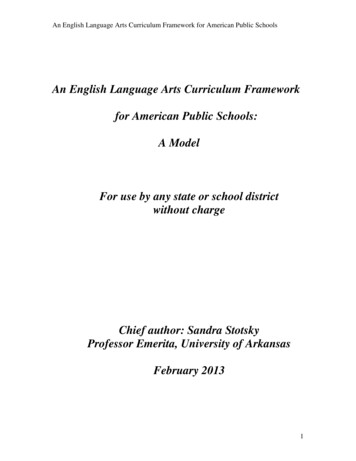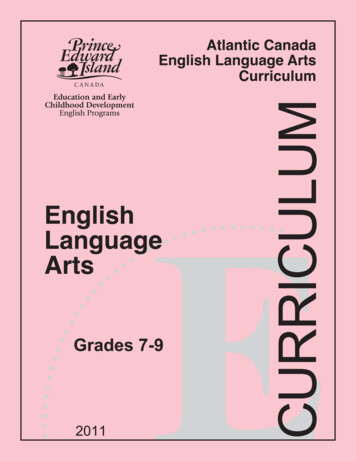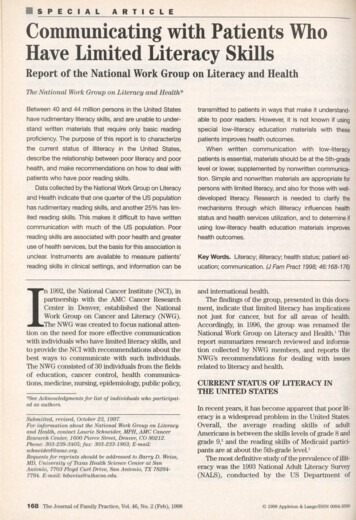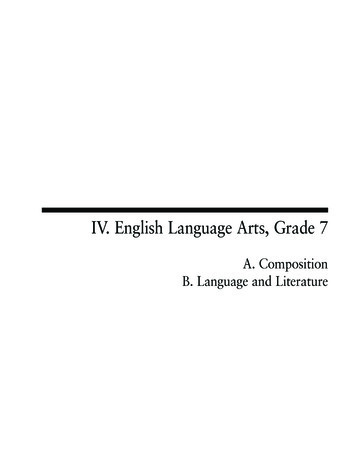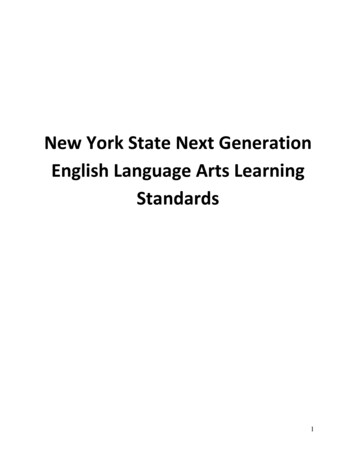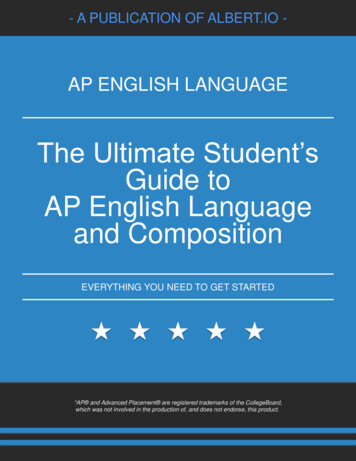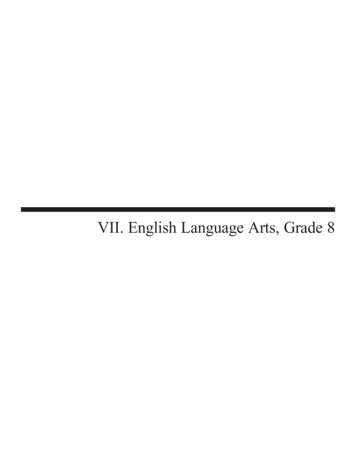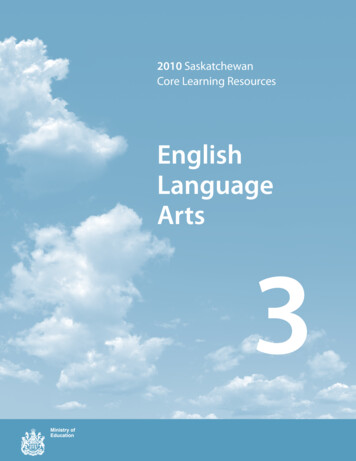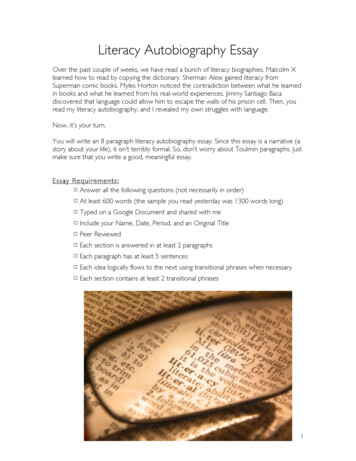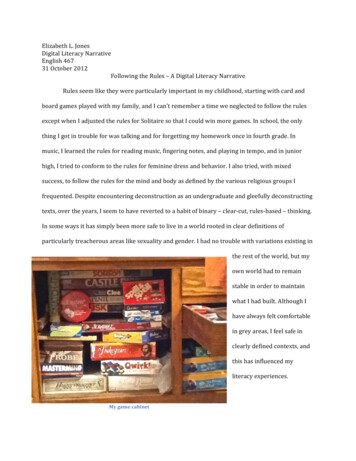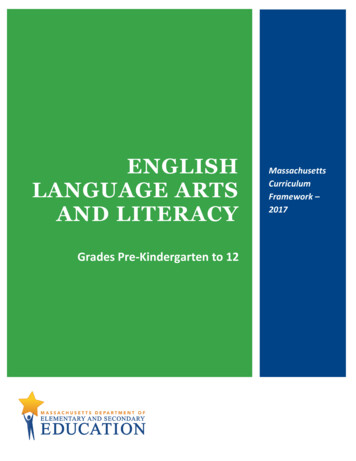
Transcription
ENGLISHLANGUAGE ARTSAND LITERACYGrades Pre-Kindergarten to 12iMassachusettsCurriculumFramework –2017
This document was prepared by the Massachusetts Department of Elementary and Secondary EducationBoard of Elementary and Secondary Education MembersMr. Paul Sagan, Chair, CambridgeMr. James Morton, Vice Chair, BostonMs. Katherine Craven, BrooklineDr. Edward Doherty, Hyde ParkDr. Roland Fryer, CambridgeMs. Margaret McKenna, BostonMr. Michael Moriarty, HolyokeDr. Pendred Noyce, BostonMr. James Peyser, Secretary of Education, MiltonMs. Mary Ann Stewart, LexingtonMr. Nathan Moore, Chair, Student Advisory Council,ScituateMitchell D. Chester, Ed.D., Commissioner and Secretary to the BoardThe Massachusetts Department of Elementary and Secondary Education, an affirmative action employer, iscommitted to ensuring that all of its programs and facilities are accessible to all members of the public. We donot discriminate on the basis of age, color, disability, national origin, race, religion, sex, or sexual orientation.Inquiries regarding the Department’s compliance with Title IX and other civil rights laws may be directed tothe Human Resources Director, 75 Pleasant St., Malden, MA, 02148, 781-338-6105. 2017 Massachusetts Department of Elementary and Secondary Education.Permission is hereby granted to copy any or all parts of this document for non-commercial educationalpurposes. Please credit the “Massachusetts Department of Elementary and Secondary Education.”Massachusetts Department of Elementary and Secondary Education75 Pleasant Street, Malden, MA 02148-4906Phone 781-338-3000 TTY: N.E.T. Relay 800-439-2370www.doe.mass.edu
Massachusetts Department ofElementary and Secondary Education75 Pleasant Street, Malden, Massachusetts 02148-4906Dear Colleagues,I am pleased to present to you the Massachusetts Curriculum Framework for English Language Artsand Literacy adopted by the Board of Elementary and Secondary Education in March 2017. This Framework is built upon thefoundation of the 2010 Massachusetts Curriculum Framework for English Language Arts and Literacy, as well as earlierversions of our Massachusetts English Language Arts Frameworks published since 1997.The current Framework incorporates improvements suggested by Massachusetts educators after six years of experience inimplementing the 2010 standards in their classrooms. These revised pre-kindergarten to grade 12 standards are based onresearch and effective practice, and will enable teachers and administrators to strengthen curriculum, instruction, andassessment.The 2017 standards draw from the best of prior Massachusetts English Language Arts and Literacy Curriculum Frameworks,and represent the input of hundreds of the Commonwealth’s pre-K–12 and higher education faculty. The 2017 standardsembody the Commonwealth’s commitment to providing all students with a world-class education.This revision of the Framework retains the strengths of the previous frameworks and includes these improved features: Increased coherence among the Reading, Writing, Speaking and Listening, and Language Standards.Incorporation of instructional examples from the 2001 Massachusetts standards.Stronger demonstrations of how literacy instruction—particularly in the early elementary years—is intertwinedwith learning in mathematics, science, social studies, the arts, and other subjects of a well-balanced curriculum.Higher ambitions for student achievement, including standards that were written to provide more rigorouspreparation for college, careers, and civic participation.Numerous classroom instructional examples and samples of authentic student writing from Massachusettsclassrooms to clarify the meaning of the standards.In the course of revising these standards, the Department received many valuable comments and suggestions. I want tothank everyone who contributed their ideas, enthusiasm, and determination to make the standards useful for students,families, educators, and the community. In particular, I am grateful to the members of the ELA/Literacy Standards ReviewPanel and to our Content Advisors, for giving their time generously to the project of improving learning standards forMassachusetts students. I am proud of the work that has been accomplished.We will continue to collaborate with schools and districts to implement the 2017 Massachusetts Curriculum Framework forEnglish Language Arts and Literacy over the next several years. All Massachusetts frameworks are subject to continuousreview and improvement for the benefit of the students of the Commonwealth.We hope you will find this Framework useful in building a strong ELA/literacy curriculum for your school or district. A wellrounded ELA curriculum should expose students to a rich diversity of high-quality, authentic literature from multiple genres,cultures, and time periods. The purpose of teaching literature is not only to sharpen skills of comprehension and analysis,but also to instill in students a deep appreciation for art, beauty, and truth, while broadening their understanding of thehuman condition from differing points of view. Reading and discussing important works of prose and poetry will also helpstudents develop empathy for others while learning about who they are as individuals and members of a wider civilizationand world.Thank you again for your ongoing support and for your commitment to achieving the goal of improved achievement for allstudents.Sincerely,Mitchell D. Chester, Ed.D.Commissioner of Elementary and Secondary Education
Table of ContentsAcknowledgments .6Introduction .9Guiding Principles for English Language Arts and Literacy Programs . 15Students Who Are Ready for College, Careers, and Civic Participation . 17College and Career Readiness and Civic Preparation . 18Standards for English Language Arts & Literacy in History/Social Studies,Science, Mathematics, and Technical Subjects Pre-K through Grade 5 . 20College and Career Readiness Anchor Standards for Reading . 21College and Career Readiness Anchor Standards for Writing . 22College and Career Readiness Anchor Standards for Speaking and Listening. 24College and Career Readiness Anchor Standards for Language . 25Pre-KPre-K Reading Standards . 26Pre-K Reading Standards for Literature [RL] . 26Pre-K Reading Standards for Informational Text [RI] . 26Pre-K Reading Standards for Foundational Skills [RF] . 27Pre-K Writing Standards [W] . 28Pre-K Speaking and Listening Standards [SL] . 29Pre-K Language Standards [L] . 29KindergartenKindergarten Reading Standards . 31Kindergarten Reading Standards for Literature [RL] . 31Kindergarten Reading Standards for Informational Text [RI] . 31Kindergarten Reading Standards for Foundational Skills [RF] . 32Kindergarten Writing Standards [W] . 33Kindergarten Speaking and Listening Standards [SL] . 34Kindergarten Language Standards [L] . 35Grade 1Grade 1 Reading Standards . 37Grade 1 Reading Standards for Literature [RL] . 37Grade 1 Reading Standards for Informational Text [RI] . 37Grade 1 Reading Standards for Foundational Skills [RF] . 38Massachusetts Curriculum Framework for English Language Arts and Literacy1
Grade 1 Writing Standards [W] . 39Grade 1 Speaking and Listening Standards [SL] . 40Grade 1 Language Standards [L] . 41Grade 2Grade 2 Reading Standards . 43Grade 2 Reading Standards for Literature [RL] . 43Grade 2 Reading Standards for Informational Text [RI] . 43Grade 2 Reading Standards for Foundational Skills [RF] . 44Grade 2 Writing Standards [W] . 45Grade 2 Speaking and Listening Standards [SL] . 46Grade 2 Language Standards [L] . 48Grade 3Grade 3 Reading Standards . 50Grade 3 Reading Standards for Literature [RL] . 50Grade 3 Reading Standards for Informational Text [RI] . 50Grade 3 Reading Standards for Foundational Skills [RF] . 51Grade 3 Writing Standards [W] . 52Grade 3 Speaking and Listening Standards [SL] . 54Grade 3 Language Standards [L] . 55Grade 4Grade 4 Reading Standards . 58Grade 4 Reading Standards for Literature [RL] . 58Grade 4 Reading Standards for Informational Text [RI] . 58Grade 4 Reading Standards for Foundational Skills [RF] . 59Grade 4 Writing Standards [W] . 60Grade 4 Speaking and Listening Standards [SL] . 62Grade 4 Language Standards [L] . 63Grade 5Grade 5 Reading Standards . 66Grade 5 Reading Standards for Literature [RL] . 66Grade 5 Reading Standards for Informational Text [RI] . 66Grade 5 Reading Standards for Foundational Skills [RF] . 67Grade 5 Writing Standards [W] . 68Grade 5 Speaking and Listening Standards [SL] . 70Massachusetts Curriculum Framework for English Language Arts and Literacy2
Grade 5 Language Standards [L] . 71Resources for Implementing the Pre-K–5 Standards . 74Range, Quality, and Complexity of Student Reading Pre-K–5 . 79Qualitative Analysis of Literary Texts for Pre-K–5: A Continuum of Complexity . 80Qualitative Analysis of Informational Texts for Pre-K–5: A Continuum of Complexity . 81Texts Illustrating the Range, Quality, and Complexity of Student Reading Pre-K–5 . 82Sample Text Set for the Elementary Grades: Water . 83Key Cumulative Language Standards, Grades 3–12 . 84Standards for English Language Arts Grades 6 through 12 . 85College and Career Readiness Anchor Standards for Reading . 86College and Career Readiness Anchor Standards for Writing . 87College and Career Readiness Anchor Standards for Speaking and Listening. 88College and Career Readiness Anchor Standards for Language . 89Grade 6Grade 6 Reading Standards . 90Grade 6 Reading Standards for Literature [RL] . 90Grade 6 Reading Standards for Informational Text [RI] . 90Grade 6 Writing Standards [W] . 91Grade 6 Speaking and Listening Standards [SL] . 93Grade 6 Language Standards [L] . 94Grade 7Grade 7 Reading Standards . 96Grade 7 Reading Standards for Literature [RL] . 96Grade 7 Reading Standards for Informational Text [RI] . 97Grade 7 Writing Standards [W] . 97Grade 7 Speaking and Listening Standards [SL] . 100Grade 7 Language Standards [L] . 100Grade 8Grade 8 Reading Standards . 102Grade 8 Reading Standards for Literature [RL] . 102Grade 8 Reading Standards for Informational Text [RI] . 102Grade 8 Writing Standards [W] . 103Grade 8 Speaking and Listening Standards [SL] . 105Grade 8 Language Standards [L] . 106Massachusetts Curriculum Framework for English Language Arts and Literacy3
Grades 9–10Grades 9–10 Reading Standards. 108Grades 9–10 Reading Standards for Literature [RL] . 108Grades 9–10 Reading Standards for Informational Text [RI] . 108Grades 9–10 Writing Standards [W]. 109Grades 9–10 Speaking and Listening Standards [SL] . 111Grades 9–10 Language Standards [L] . 112Grades 11–12Grades 11–12 Reading Standards . 115Grades 11–12 Reading Standards for Literature [RL] . 115Grades 11–12 Reading Standards for Informational Text [RI] . 115Grades 11–12 Writing Standards [W]. 116Grades 11–12 Speaking and Listening Standards [SL] . 119Grades 11–12 Language [L] . 119Resources for Implementing the Grades 6–12 Standardsfor English Language Arts . 121Range, Quality, and Complexity of Student Reading in English Language Arts, Grades 6–12. 124Qualitative Analysis of Literary Texts for Grades 6–12: A Continuum of Complexity . 125Qualitative Analysis of Informational Texts for Grades 6–12: A Continuum of Complexity. 126Texts Illustrating the Range, Quality, and Complexity ofStudent Reading in English Language Arts, Grades 6–12 . 127Sample Text Set for Middle School Language Arts: Powerful Friendships . 128Key Cumulative Language Standards, Grades 3–12 . 129Standards for Literacy in the Content Areas Grades 6 through 12 . 130College and Career Readiness Anchor Standards for Reading . 131College and Career Readiness Anchor Standards for Writing . 132College and Career Readiness Anchor Standards for Speaking and Listening. 134Grades 6–8Grades 6–8 Reading Standards. 135Grades 6–8 Reading Standards for Literacy in the Content Areas: History/Social Studies [RCA-H]. 135Grades 6–8 Reading Standards for Literacy in the Content Areas:Science and Career and Technical Subjects [RCA-ST] . 135Grades 6–8 Writing Standards for Literacy in the Content Areas [WCA] . 136Grades 6–8 Speaking and Listening Standards for Literacy in the Content Areas [SLCA] . 139Grades 9–10Massachusetts Curriculum Framework for English Language Arts and Literacy4
Grades 9–10 Reading Standards. 141Grades 9–10 Reading Standards for Literacy in the Content Areas: History/Social Studies [RCA-H]. 141Grades 9–10 Reading Standards for Literacy in the Content Areas:Science and Career and Technical Subjects [RCA-ST] . 141Grades 9–10 Writing Standards for Literacy in the Content Areas [WCA] . 142Grades 9–10 Speaking and Listening Standards for Literacy in the Content Areas [SLCA] . 144Grades 11–12Grades 11–12 Reading Standards . 146Grades 11–12 Reading Standards for Literacy in the Content Areas: History/Social Studies [RCA-H]. 146Grades 11–12 Reading Standards for Literacy in the Content Areas:Science and Career and Technical Subjects [RCA-ST] . 146Grades 11–12 Writing Standards for Literacy in the Content Areas [WCA] . 147Grades 11–12 Speaking and Listening Standards for Literacy in the Content Areas [SLCA] . 149Resources for Implementing the Grades 6–12 Standardsfor Literacy in the Content Areas . 151Qualitative Analysis of Informational Texts for Grades 6–12: A Continuum of Complexity. 154Appendix A: Application of the Standards for English Learners and Students with Disabilities . 155English Learners . 155Students with Disabilities. 156Appendix B: A Literary Heritage . 158I. Suggested Authors, Illustrators, and Works from the Ancient World to the Late Twentieth Century . 158II. Suggested Authors and Illustrators from the Late Twentieth and Early Twenty-First Centuries . 164III. Suggested Authors of Contemporary and Historical World Literature . 170Appendix C: Glossary of Terms . 172Appendix D: Resources and Bibliography. 187Massachusetts Curriculum Framework for English Language Arts and Literacy5
AcknowledgmentsMassachusetts Curriculum Frameworks for English Language Arts and Literacyand Mathematics Review Panel, 2016–2017Rachel Barlage, Lead English Teacher, Chelsea HighSchool, Chelsea Public SchoolsJennifer Berg, Assistant Professor of Mathematics,Fitchburg State UniversityTara Brandt, Mathematics Supervisor, K–12,Westfield Public SchoolsJennifer Camara-Pomfret, English Teacher, SeekonkHigh School, Seekonk Public SchoolsTricia Clifford, Principal, Mary Lee Burbank School,Belmont Public SchoolsLinda Crockett, Literacy Coach, Grades 6–8, WestfieldSouth Middle School, Westfield Public SchoolsLinda Dart-Kathios, Mathematics DepartmentChairperson, Middlesex Community CollegeLinda Davenport, Director of K–12 Mathematics,Boston Public SchoolsBeth Delaney, Mathematics Coach, Revere PublicSchoolsLisa Dion, Manager of Curriculum, Data andAssessment, New Bedford Public SchoolsTom Fortmann, Community Representative,LexingtonOneida Fox Roye, Director of English Language Artsand Literacy, K–12, Boston Public SchoolsAndrea Gobbi, Director of Academic Programs,Shawsheen Valley Technical High SchoolDonna Goldstein, Literacy Coach, Coelho MiddleSchool, Attleboro Public SchoolsAndrea Griswold, Grade 8 English Teacher, MohawkTrail Regional Middle and High School, MohawkTrail/Hawlemont Regional School DistrictSusan Hehir, Grade 3 Teacher, Forest AvenueElementary School, Hudson Public SchoolsAnna Hill, Grade 6 English Language Arts Teacher,Charlton Middle School, Charlton Public SchoolsSarah Hopson, K–4 Math Coach, Agawam ElementarySchools, Agawam Public SchoolsNancy Johnson, Grades 7–12 Mathematics Teacherand Department Head, Hopedale Jr.-Sr. High School,Hopedale Public Schools (retired); President,Association of Teachers of Mathematics inMassachusettsPatty Juranovits, Supervisor of Mathematics, K–12,Haverhill Public SchoolsElizabeth Kadra, Grades 7 & 8 Mathematics Teacher,Miscoe Hill Middle School, Mendon-Upton RegionalSchool DistrictPatricia Kavanaugh, Middle School MathematicsTeacher, Manchester-Essex Middle and High School,Manchester-Essex Regional School DistrictJohn Kucich, Associate Professor of English,Bridgewater State UniversityDavid Langston, Professor ofEnglish/Communications, Massachusetts College ofLiberal ArtsStefanie Lowe, Instructional Specialist, SullivanMiddle School, Lowell Public SchoolsLinda McKenna, Mathematics Curriculum Facilitator,Leominster Public SchoolsEileen McQuaid, 6–12 Coordinator of EnglishLanguage Arts and Social Studies, Brockton PublicSchoolsMatthew Müller, Assistant Professor of English,Berkshire Community CollegeRaigen O'Donohue, Grade 5 Teacher, ColumbusElementary School, Medford Public SchoolsEileen Perez, Assistant Professor of Mathematics,Worcester State UniversityLaura Raposa, Grade 5 Teacher, Russell StreetElementary School, Littleton Public SchoolsDanika Ripley, Literacy Coach, Dolbeare ElementarySchool, Wakefield Public SchoolsHeather Ronan, Coordinator of Math and Science,PK–5, Brockton Public SchoolsFran Roy, Chief Academic Officer/AssistantSuperintendent, Fall River Public SchoolsMelissa Ryan, Principal, Bourne Middle School,Bourne Public SchoolsKaryn Saxon, K–5 Curriculum Director, EnglishLanguage Arts and Social Studies, Wayland PublicSchoolsJeffrey Strasnick, Principal, Wildwood Early ChildhoodCenter and Woburn Street Elementary School,Wilmington Public SchoolsKathleen Tobiasson, Grades 6 & 7 English Teacher,Quinn Middle School, Hudson Public SchoolsBrian Travers, Associate Professor of Mathematics,Salem State UniversityNancy Verdolino, K–6 Reading Spec
English Language Arts and Literacy over the next several years. All Massachusetts frameworks are subject to continuous review and improvement for the benefit of the students of the Commonwealth. We hope you will find this Framework useful in building a strong ELA
